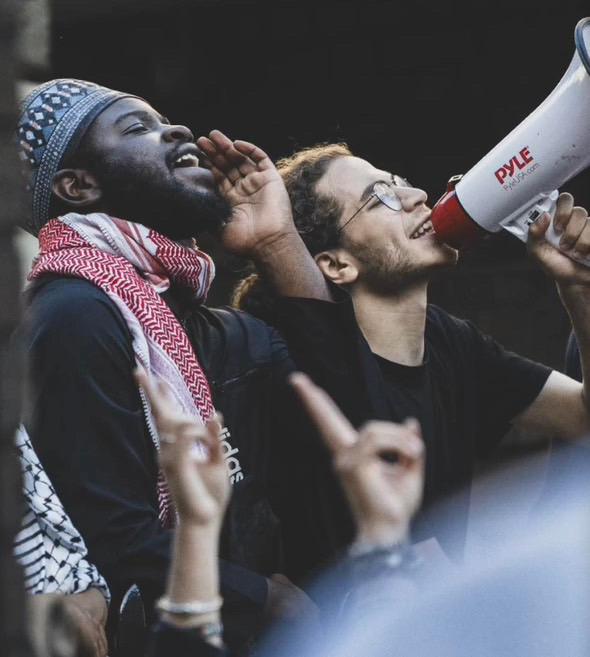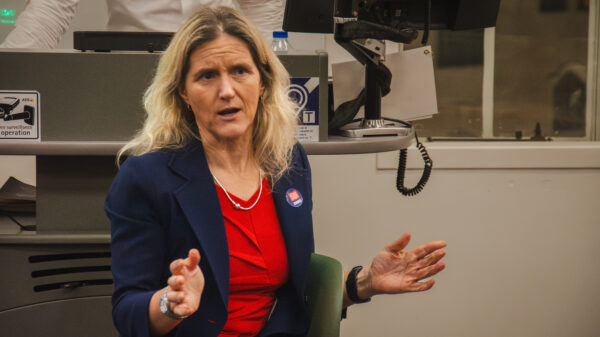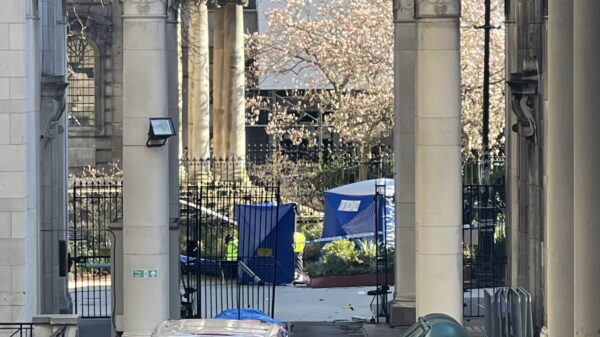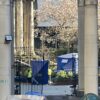Usama Ghanem, an Egyptian student previously imprisoned and tortured for political activism, faces possible deportation after being indefinitely suspended by King’s College London (KCL). Roar sat down with Ghanem to discuss his experiences and the circumstances surrounding his suspension.
While Ghanem’s visa will be officially reported for cancellation by KCL to the Home Office on 28 November, the student launched a judicial review against the University in early October, hoping to reverse the University’s decision.
News of the student’s battle against King’s was received with a largely supportive response from the pro-Palestine movement and the student community across London.
On Thursday, 30 October, a group of some 70 students rallied in front of the University’s gates to demonstrate their dissent towards KCL’s treatment of Ghanem. On social media, a petition started by CAGE International, an advocacy group assisting Ghanem in his legal battle against the university, has been endorsed by multiple student groups. Among these, KCL Stands for Justice (KCL S4J), Palestine Lobby and the Association of Student Activism for Palestine (ASAP).
An open letter has been signed by 380 people, condemning KCL’s action as “a serious violation of freedom of speech, students’ rights, and basic human decency.” Among the signatures are multiple KCL academics, along with those of other London universities including Queen Mary University London (QMUL) and SOAS.
Roar recently spoke with Usama Ghanem, a 21-year-old international student at KCL, to discuss his activist history in Egypt, his activism for the pro-Palestinian student movement and the threats he faces following the University’s disciplinary action against him.
“I see the news online and it’s really heartwarming,” Ghanem said when asked if he expected this reaction from the student community. “It’s moments like this that not only define my student experience, but define the wider student experience for us as people in this university.”
Early Days in the Pro-Palestine Movement at King’s
On 22 October, news broke that student Usama Ghanem faced the threat of torture if he is forced to return to Egypt, due to KCL pursuing disciplinary action against him.
Ghanem had been participating in pro-Palestine activism since the start of his studies at King’s in 2023, when he co-founded the society House of Wisdom, and later went on to conduct negotiations between King’s and the student encampments in May 2024.
“There was a need for a space to discuss the genocide in Gaza and for students to not only debate with each other, but to take collective responsibilities of those issues.” Ghanem said, recalling the beginnings of his activism at King’s.

It was on 19 June 2024, following his participation in a peaceful protest at a KCL alumni dinner, that Ghanem was suspended by emergency powers and was forced out of the encampments in the midst of negotiations. When an emergency suspension is issued, students are temporarily prohibited from being on campus.
After hiring an independent HR investigator who produced a 147-page report on Ghanem, KCL substituted the emergency suspension for a cease-and-desist order, forbidding him from participating in any campus protests, which remains in effect to this day.
The investigator did not find any evidence to substantiate KCL’s claim that Ghanem was the leader of the protests.
On 22 May 2025, following the disruptions to an event hosting a pro-Israel speaker and a letter from the Campaign Against Antisemitism (CAA) to KCL Vice-Chancellor and President Shitij Kapur, Ghanem was issued an indefinite suspension letter stating, “You have to go back to your home country.”
Talking to Roar about the process that led to his suspension, and the evidence King’s presented to the disciplinary committee, Ghanem affirmed that he was never given the opportunity to be interviewed.
He also said he was never able to see the evidence that was presented against him, with the exception of one short video, until after an independent report was commissioned by the University.
When asked to comment, a spokesperson for KCL said: “We want to make it absolutely clear that we do not discipline students for lawful affiliations, including support for pro-Palestine views, nor for participating in lawful protests. Any disciplinary measures are taken solely in response to breaches of our policies and regulations which are in place to maintain a safe and inclusive environment on campus for everyone.”
They continued, “The safety and wellbeing of our students and staff is our highest priority and action is only undertaken following a robust investigation, conducted in line with our policies and procedures, and only when behaviour has been found to be in breach of these regulations.”
“In all of this process, the University is the judge and the jury. The University is who I am protesting against, and who I am criticising, and the same people who are punishing me.” Ghanem said, “It breaks the basic concepts of a fair trial and a fair investigation.”
KCL Updates Contentious Events Procedures Following Pro-Palestine Protests
Following the student encampments in May 2024, King’s approved an amendment to the Contentious Events & Protest Procedures.
The new procedure, effective from 1 August 2025 targets the management of “protests, events, and other open space gatherings organised by members of the King’s student and/or staff community” on campus grounds, or their immediate proximities.
According to Ghanem, there are around 27 ongoing disciplinary cases at King’s for participation in pro-Palestine protests, on the basis of the new procedure.
Ghanem alleged that the updated policy was “tailor-made to criminalise the pro-Palestine movement for the encampment.”
When asked for comment, a spokesperson for King’s replied: “Freedom of speech for students and staff is a fundamental right and we have and will continue to support the right to protest within the law.
“We are proud of our long history of upholding the right to freedom of expression and the right to lawful protest. Many peaceful protests, vigils, and events that reflect our diverse student body have been—and will continue to be—held at King’s.”
Among the acts of protest prohibited by the Contentious Events & Protests Procedures, some of which have been updated after the encampments in May 2024, there are several which directly affect demonstrations: “the use of loudhailers, loudspeakers and other noise-making devices,” the establishment of “tents or other structures” on campus, and the obstruction of “paths, roads, entrances and exits from King’s venues and campuses.”
All of the above have been used extensively in pro-Palestine demonstrations in the past three years.
When asked if he had a message for the student community at King’s, Ghanem expressed his concern for the survival of freedom of speech at the University.
“It’s time to make our voices heard. It’s time for us to call in our elected officials in the student union. It’s time for us to call in the UCU.” He said, “But also, more importantly, it’s time to call ourselves to stand to King’s.”
Ghanem continued, “It’s time to for us to bring those issues into our lectures, into our seminars and to our staff. It’s time for us to protest on campus. To make this an unavoidable reality.”
From Political Activism to Persecution
Usama Ghanem comes from a family of political dissidents to the Egyptian regime. Ghanem and his family were victims of persecution due to their political opposition during and after the Arab Spring, and were forced to flee to Turkey when Ghanem was only 16 years old.
“We’ve [Ghanem’s family] known what a bitter experience it represents, and we knew how arbitrary, against the law and violative of human rights this persecution was and is,” he said, when asked about what he will face if he is forced to go back to Egypt.
This information, along with his diagnosis with post-traumatic stress disorder (PTSD) following violent treatment in prison, had been available to King’s since the beginning of his studies.
Recalling his first experiences of activism, Ghanem reflected on his father as a source of inspiration. A university professor in Cairo, “He campaigned for freedom, for democracy, and for human rights,” Ghanem recalled. “I really understand why he dedicated his life to fighting against injustices, right now, seeing it firsthand.”
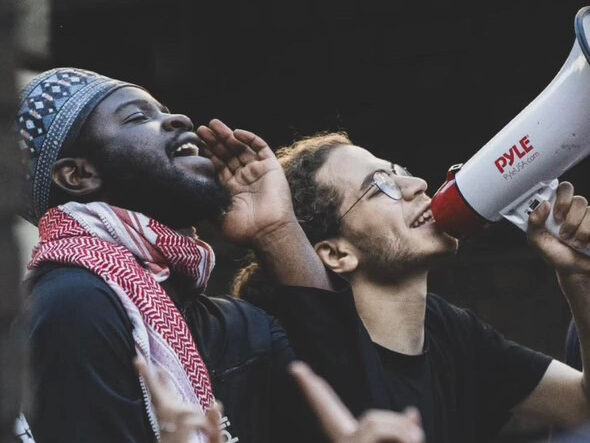
Ghanem is reluctant to apply for political asylum in the UK, as he feels it would shift attention away from the core issue.
He said, “I came into this country legally. I’ve had a legal status through my student visa in the UK. And I have been excelling in my studies for the last 3 years.”
“I refuse to categorise this as an immigration issue rather than a free speech issue against King’s,” he affirmed.
Referring to his ongoing struggle to counter King’s case against him, he continued:
“My plan is to hold the university accountable because this precedent concerns much more than just myself.
“I understand now more than ever why we need this”.

